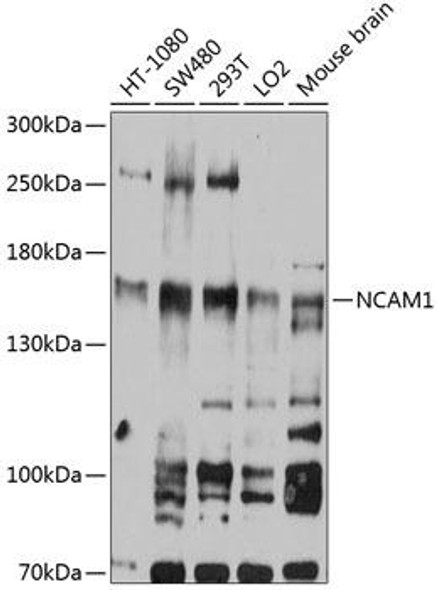NCAM1 Antibody (PACO21459)
- SKU:
- PACO21459
- Product type:
- Antibody
- Reactivity:
- Human
- Mouse
- Host Species:
- Rabbit
- Isotype:
- IgG
- Application:
- ELISA
- Application:
- WB
- Antibody type:
- Polyclonal
- Conjugation:
- Unconjugated
Frequently bought together:
Description
| Antibody Name: | NCAM1 Antibody (PACO21459) |
| Antibody SKU: | PACO21459 |
| Size: | 100ul |
| Host Species: | Rabbit |
| Tested Applications: | ELISA, WB |
| Recommended Dilutions: | ELISA:1:2000-1:10000, WB:1:500-1:1000 |
| Species Reactivity: | Human, Mouse |
| Immunogen: | Peptide sequence around aa.850~854(Q-T-K-E-N)derived from Human CD56(NCAM). |
| Form: | Liquid |
| Storage Buffer: | Supplied at 1.0mg/mL in phosphate buffered saline (without Mg2+ and Ca2+), pH 7.4, 150mM NaCl, 0.02% sodium azide and 50% glycerol. |
| Purification Method: | Antibodies were produced by immunizing rabbits with synthetic peptide and KLH conjugates. Antibodies were purified by affinity-chromatography using epitope-specific peptide. |
| Clonality: | Polyclonal |
| Isotype: | IgG |
| Conjugate: | Non-conjugated |
 | Western blot analysis of extract from rat brain, rat hippocampus and mouse brain using CD56(NCAM) Antibody. |
| Background: | NCAM (neural cell adhesion molecule, CD56) is an adhesion glycoprotein with five extracellular immunoglobulin-like domains followed by two fibronectin type III repeats. Structural diversity is introduced by alternative splicing resulting in different cytoplasmic domains (1). NCAM mediates neuronal attachment, neurite extension and cell-cell interactions through homo and heterophilic interactions. PSA (polysialic acid, post-translationally modifies NCAM and increases the metastatic potential of small cell lung carcinoma, Wilms+ tumor, neuroblastoma and rhabdomyosarcoma (2). CD56 and CD16 are commonly used to identify NK cells although some cells with the T cell markers CD3 and CD4 also express CD56 (3). Seidenfaden, R. et al. (2003) Mol. Cell. Biol. 23, 5908-5918. |
| Synonyms: | MSK39; NCAM1; |
| UniProt Protein Function: | NCAM1: This protein is a cell adhesion molecule involved in neuron-neuron adhesion, neurite fasciculation, outgrowth of neurites, etc. 6 isoforms of the human protein are produced by alternative splicing. |
| UniProt Protein Details: | Protein type:Membrane protein, GPI anchor; Membrane protein, integral; Cell adhesion; Motility/polarity/chemotaxis Chromosomal Location of Human Ortholog: 11q23.1 Cellular Component: Golgi membrane; cell surface; membrane; integral to membrane; plasma membrane; external side of plasma membrane Molecular Function:identical protein binding Biological Process: axon guidance; extracellular matrix organization and biogenesis; cytokine and chemokine mediated signaling pathway; cell adhesion |
| NCBI Summary: | This gene encodes a cell adhesion protein which is a member of the immunoglobulin superfamily. The encoded protein is involved in cell-to-cell interactions as well as cell-matrix interactions during development and differentiation. The encoded protein has been shown to be involved in development of the nervous system, and for cells involved in the expansion of T cells and dendritic cells which play an important role in immune surveillance. Alternative splicing results in multiple transcript variants. [provided by RefSeq, Jun 2011] |
| UniProt Code: | P13591 |
| NCBI GenInfo Identifier: | 205830665 |
| NCBI Gene ID: | 4684 |
| NCBI Accession: | P13591.3 |
| UniProt Related Accession: | P13591 |
| Molecular Weight: | |
| NCBI Full Name: | Neural cell adhesion molecule 1 |
| NCBI Synonym Full Names: | neural cell adhesion molecule 1 |
| NCBI Official Symbol: | NCAM1 |
| NCBI Official Synonym Symbols: | CD56; NCAM; MSK39 |
| NCBI Protein Information: | neural cell adhesion molecule 1 |
| UniProt Protein Name: | Neural cell adhesion molecule 1 |
| UniProt Synonym Protein Names: | CD_antigen: CD56 |
| UniProt Gene Name: | NCAM1 |
| UniProt Entry Name: | NCAM1_HUMAN |
| Secondary Antibody |
| Anti-HRP Goat Anti-Rabbit IgG (H+L) Antibody (CABS014) |
| Recommended Products |
| Anti-FITC Goat Anti-Rabbit IgG (H+L) Antibody (CABS011) |
| Anti-HRP-conjugated Beta Actin Antibody (CABC028) |










